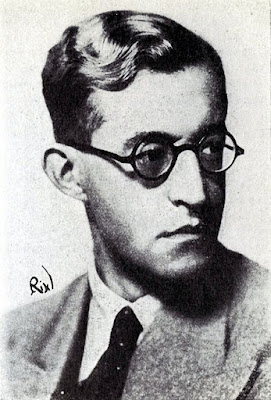The Swedish author and translator Arvid Brenner, born as Fritz Helge Heerberger, was born in Berlin in 1907 and he died in Stockholm in 1975.
He studied in Germany and settled in Sweden after the Nazis took over in 1933. Brenner became a Swedish citizen in 1938 and wrote a column in the magazine Tidevarvet. A popular author in the 1940s, he was then forgotten for many years, until Ingemar Hermansson wrote a biography about him.
His novel Kompromiss (The Compromise),
published in Swedish in 1934, describes the atmosphere in Berlin
just before Hitler took over, of how it felt to be there at that
time, of what people talked about and dreamt of. Strangely, the novel
doesn’t seem to be translated, not even to German, despite being a
very interesting document about German history.
Here, a short excerpt:
I
had met Nina at a studio party. For some reason she liked me, and I
did not even try to resist. I still suffered too much of inferiority complexes
not to feel flattered by the attention of such girls. Yes, Nina was
cute. Cute in exactly the same way as thousands of other girls in
Europe and America. Her appearance was ordinary, of standard type. Or
maybe not. / ... /
She did not want to lay her hands on a millionaire, she wanted to become rich herself. Probably she would, because she was energetic, purposeful. I did not see that clearly the first evening, but eventually I did. Because we went on meeting. Nina had a haunt, a little intimate bar, the Jockey-bar was it called, there you sat in small red-velvety booths and drank a hellish blend of ice cream, soda water, gin and garishly colored berries, which cost two marks a glass. I said that I would not pay that. Nina replied that she paid thirty pfennig for the concoction, she was good friend with the place’s owner. A small but good orchester played, and there was always the same audience, a mixture of Kurfürstendamm people and more or less perverse and doubtful elements. /.../
Nina
found it fit to grow "spiritual interests" (as she called
it), along with her modern chilly matter-of-factness. She told me
than her acquaintances were superficial, and she longed for more
"deep" natures. She enjoyed discussing the day’s
questions with me and telling me of her soul's unsatisfaction. /.../
She and Paul Dunker had a firm together, which they started with a small fortune she inherited. They made ultra-modern furniture and home decorations. Paul had been to a renowned arts and crafts school, which embraced a radical functionalist style and was hated by all reactionaries, as it was labeled “cultural Bolshevik”, especially as it was also vaguely communist-oriented. Paul on his side had certainly no interest in communism - he had no other opinions than that he was entitled to any liberties he wanted to take, and that it was a good thing to make money on funcionalist furniture. /.../
Paul
and Nina were full-fledged representatives of a certain kind of
modern youth - hardened, effective, americanized- who had neither
inhibitions or dreams, who just wanted to succeed. They were
undoubtedly very healthy. The fact that they occasionally enjoyed
playing with vices, did not matter. Nina used to tell that she had
taken cocaine for some time. Either it was true or not-in any case,
she had never been addicted, her self-preservation instinct was too
strong for that. /.../
Frau Dunker, Paul's mother, lived in a newly built neighborhood in the far Westend. It was night and we were watching the shine from the headlight of the radio tower that swept across the black sky. The traffic noise was heard, weak and far away.
"Do you enjoy Berlin? "I asked at random.
She made a gesture like if she was freezing in the middle of August. Then she said:
"If you knew how I abhor Berlin. I do not think there is any city around the world as unpleasant as this one. It has no atmosphere of its own, it's like a huge station, where everyone is only on transit and no one lives. Everything is ghastly and desolate here. I long back to Stuttgart. There are so beautiful forests down there. Here there are also forests, but they have no moss and are full of people.
My own translation
 |
| Arvid Brenner, Swedish-German author |


No comments:
Post a Comment